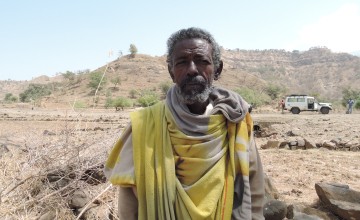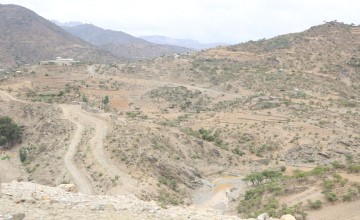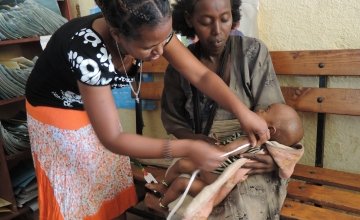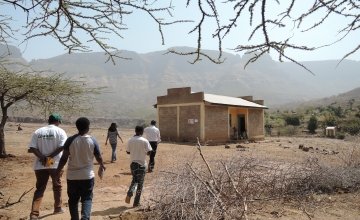
Read our 2023 annual report

Knowledge Hub
Voices from Ethiopia: Drought driving malnutrition

Ethiopia is experiencing the worst drought for 50 years and over 10.2 million people are now in need of food assistance. Farmer Tsesay Adse and health worker Belynesh Haile speak about the reality of watching crops fail and malnutrition take hold in their communities.
Ethiopia is currently experiencing its worst drought for 50 years, driven by one of the strongest El Niño events on record. Over 10.2 million people are now in need of food assistance and this figure is expected to grow to 15 million this year. In the most affected areas, one million livestock have died, and over 1.7 million are reportedly at risk.
Disaster on such a scale is impossible to comprehend through statistics alone. Farmer Tsesay Adse and health extension worker Belynesh Haile from Tslemti woreda tell of the reality of watching crops fail and malnutrition take hold in their communities.

“We’ve never seen a drought this bad”
Like other farmers in his area, Tsesay Adse, a 68 year old grandfather and farmer, is waiting for the rains to come in order to plant his crop.
He is one of approximately 80% of Ethiopians who rely on farming to get by and, understandably, this “terrible” drought weighs heavily on his mind. Tsesay has never seen things this bad as this, even during the notorious food crisis of 1984.
It was severe in the 1980s of course, across the country, but this area [in Tigray] was not affected as badly. In fact, I remember people moving here from other parts of the country because there was some food here.
A pattern gone askew
Ethiopia traditionally had two rainy seasons – spring and summer. However, seasonal patterns can no longer be relied upon, according to Tsesay.
"Rain has been decreasing year on year here for the last 20 years. It is now completely erratic and it comes in different amounts and at different times of the year,” he says.
Even adaptation is proving difficult for Tsesay and his fellow farmers.
“Over the years, I have tried adapting to the rains by delaying the planting times, or by planting crops that require less water, but it is hard without having the right information.”
In 2015, the pattern went particularly askew: the spring rain failed in most areas while the summer rain was disrupted by El Niño. This led to Tsesay’s crop failing completely over the last year.
Increase in malnutrition
Belynesh Haile, a health worker also in Tslemti woreda, is bearing witness to the knock-on effects of crop failures like Tsesay’s. Since she began her career ten years ago, she has never seen malnutrition levels so high.
In my experience, acute malnutrition has been decreasing over the years but, in the last year, there has been a huge increase. I think it is because of the drought.

There are thousands of health workers like Belynesh managing rural health posts and doing outreach work in homes across Ethiopia. Her training covers a wide range of areas but Belynesh has noticed a much stronger focus on malnutrition in her work in over the past year.
“The most common areas I work on are post-natal advice, family planning, immunisations, and for the last year, outpatient therapeutic care for malnourished mothers and children,” she explains.
Fighting to reduce malnutrition
Concern has been on the ground in Ethiopia for over 40 years. However, in the past year, the number of Concern staff in the country, mainly skilled local people, has jumped from 200 to 400 as we work with the government to help address malnutrition.
We are supporting health posts, such as the one Belynesh works at, by ensuring they are fully supplied with therapeutic food for malnourished children and mothers, along with essential medicines. Our nutrition specialists have also been providing on-the-job training to health workers so that they can better diagnose and manage acute malnutrition.
Crucially, we are supporting communities to provide care at home for severely malnourished children.
The main benefit is that Concern is providing a regular supply of high-calorific food. We can rely on it. Concern is really helping to keep malnutrition rates low.
We are also helping to build the capacity of frontline government health staff and, in other areas of the country, supporting improvements in water, sanitation and hygiene.

Building resilience
The unpredictable weather patterns that Tsesay has observed may become commonplace with climate change. With this in mind, Concern is helping farmers to become more resilient to crises such as water shortages. For example, we have helped farmers grow potatoes – Irish potatoes at that – and different types of bean for the first time. In many cases, these have survived the water shortage, unlike traditional maize and wheat crops.
With your support, we can continue our work in Ethiopia and elsewhere. We can carry on working with the Ethiopian government and other organisations to empower communities like those in Tselmti woreda. Together, we can address the immediate and urgent problems of food insecurity and malnutrition, and explore long-term solutions to ensure resilience.
Help now
Donate now to help our work around the globe.





